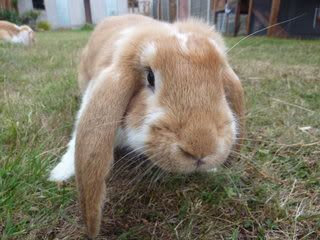rascal_rabbits
Young Bun
Hi All!
Cinnamon is booked in for her spay next month and the vet has sent me some info regarding "fluid therapy" - I havent heard of it before an wonder if anyone else has and what their opinions are of it? It sounds good to me, and I'm happy to pay extra (it costs £56) if it means an easier recovery, but then the little devil in my head wonders if its a ripp off?!
Here's the info I received - all comments gladly received!
WHAT IS AN INTRAVENOUS DRIP?
This is an infusion of electrolytes in sterile water that is given directly into the vein by means of an indwelling catheter. Fluids are given either to correct dehydration or prevent dehydration from occurring and support the circulation during an anaesthetic.
WHY IS AN INTRAVENOUS DRIP ADVISABLE DURING AN ANAESTHETIC?
During any anaesthetic there will be an immediate fall in your pet’s blood pressure. This will reduce the blood supply to vital organs such as the liver & kidneys. These organs play a crucial role in the breakdown and elimination of waste products (including the anaesthetic drugs used). By giving your pet fluid therapy directly into the vein, at a rate which can be varied according to need, the circulation is supported and vital organs can work to the best of their ability. We routinely give rabbits fluid injections under the skin which goes some way to help protect them during anaesthesia. However, an intravenous drip is much more effective.
HOW WILL MY PET BENEFIT FROM AN INTRAVENOUS DRIP?
As a result of supporting blood pressure and the organ systems during an anaesthetic, your pet should make a quicker recovery allowing an earlier return home. All patients on fluid therapy will have an indwelling catheter placed in a vein allowing us instant access to a vein in the unlikely event that any emergency drugs need to be given during anaesthesia or recovery.
IS AN INTRAVENOUS DRIP ESSENTIAL OR OBLIGATORY?
No, it is neither essential nor obligatory. If you elect not to have an intravenous drip, you are not automatically subjecting your pet to a high anaesthetic risk. However, an intravenous drip can help further reduce risk and improve recovery. We therefore regard its use as best clinical practice and recommend it in all anaesthetic procedures.

Cinnamon is booked in for her spay next month and the vet has sent me some info regarding "fluid therapy" - I havent heard of it before an wonder if anyone else has and what their opinions are of it? It sounds good to me, and I'm happy to pay extra (it costs £56) if it means an easier recovery, but then the little devil in my head wonders if its a ripp off?!
Here's the info I received - all comments gladly received!
WHAT IS AN INTRAVENOUS DRIP?
This is an infusion of electrolytes in sterile water that is given directly into the vein by means of an indwelling catheter. Fluids are given either to correct dehydration or prevent dehydration from occurring and support the circulation during an anaesthetic.
WHY IS AN INTRAVENOUS DRIP ADVISABLE DURING AN ANAESTHETIC?
During any anaesthetic there will be an immediate fall in your pet’s blood pressure. This will reduce the blood supply to vital organs such as the liver & kidneys. These organs play a crucial role in the breakdown and elimination of waste products (including the anaesthetic drugs used). By giving your pet fluid therapy directly into the vein, at a rate which can be varied according to need, the circulation is supported and vital organs can work to the best of their ability. We routinely give rabbits fluid injections under the skin which goes some way to help protect them during anaesthesia. However, an intravenous drip is much more effective.
HOW WILL MY PET BENEFIT FROM AN INTRAVENOUS DRIP?
As a result of supporting blood pressure and the organ systems during an anaesthetic, your pet should make a quicker recovery allowing an earlier return home. All patients on fluid therapy will have an indwelling catheter placed in a vein allowing us instant access to a vein in the unlikely event that any emergency drugs need to be given during anaesthesia or recovery.
IS AN INTRAVENOUS DRIP ESSENTIAL OR OBLIGATORY?
No, it is neither essential nor obligatory. If you elect not to have an intravenous drip, you are not automatically subjecting your pet to a high anaesthetic risk. However, an intravenous drip can help further reduce risk and improve recovery. We therefore regard its use as best clinical practice and recommend it in all anaesthetic procedures.


